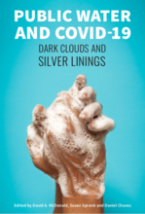Public Water and Covid-19: Dark Clouds and Silver Linings

This edited volume approaches the Covid-19 pandemic as both a crisis and an opportunity. Handwashing has become a mainstay of public health advice regarding coronavirus, and thus there has been abundant attention to the accessibility and affordability of water. But despite the clear importance of water supply, the financial prognosis for public water proivders is sombre. “Most of the public water operators showcased in this book face serious financial shortfalls as a result of Covid-19, on top of what was already a grim fiscal situation in an era of austerity, making short-term progressive public water policies difficult and diminishing longer-term options for change….As much as we might like to think that this particular pandemic will be the one to finally wake the world up to the need for adequate funding for the Sustainable Development Goal (SDG) targets in water and sanitation…even the most well-meaning of governments and donors will find it difficult to find the money given all of the other costs associated with the fallout from Covid-19.” (pages 9–11)
Public Water and Covid-19 focuses on public water systems because they make up the majority of water providers globally and (ostensibly) have a mandate to serve the social good. The editors also stress the accountability and cost savings associated with public systems. They are hoping that the pandemic will curb the tide of privatisation, and instead expand community- and municipality-managed supply.
The editors acknowledge that this book is a snapshot in time, written primarily before the second wave of Covid-19 swept into many countries. Like many academic publications that have responded swiftly to the pandemic, Public Water and Covid-19 references a number of journalistic articles in addition to the more conventional scholarly sources.
The chapters cover a wide range of contexts, including cities in Colombia, Uganda and the US. The examples are not all positive, but together they showcase the range of possibilities for improving the equity of public water provision. For instance, the “progressive actions taken by public water operators” include:
- Deferring payments
- Lowering rates
- Repairing breakdowns rapidly
- Providing closer access points
- Installing community taps
- Providing emergency water tankers in informal settlements
- Improving transparency of decision-making
- Listening to more community voices
For instance, the chapter on Burkina Faso focuses on Bissighin, an unplanned neighborhood in Ouagadougou. Starting in April, the national government, following discussion with international donors, swiftly instituted three “free water” policies in urban areas for a three-month period. Urban residents made good use of the free portion of water at standpipes, with one standpipe manager reporting seeing one person transport six 20-litre cans of water onto a single bicycle.
But authors Catherine Baron and Léandre Guigma explain that these measures did not reach everyone. The standpipe water was still inconvenient for those without transport, as well as inaccessible during curfew hours. It was also subject to shortages, exacerbated by high demand. Two-thirds of the Bissighin residents surveyed stated that their water use had increased by more than 25% since April 2020.
Bissighin is served by a small decentralized water company that is supposed to charge the same rates as the national water operator. Yet some Bissighin residents noted higher prices during the pandemic. Some also complained that standpipe managers were charging payments even during the three-month free period.
Baron and Guigma recognize that the urgency of the situation called for rapid measures. But they urge more citizen participation in these policy processes, as well as more attention to the cross-cutting nature of the issues affecting residents: “the approach
must be systemic and not isolate the water issue from other issues such as job insecurity” (page 390).
Full book available at:
https://www.municipalservicesproject.org/publication/public-water-and-co...
Further reading:
Adams, Ellis Adjei and Godfred Odei Boateng (2018), “Are urban informal communities capable of co-production? The influence of community–public partnerships on water access in Lilongwe, Malawi”, Environment and Urbanization Vol 30, No 2, pages 461–480, available at https://journals.sagepub.com/doi/full/10.1177/0956247818792059.
Farha, Leilani, Juan Pablo Bohoslavsky, Koumbou Boly Barry, Léo Heller, Olivier De Schutter and Magdalena Sepúlveda Carmona (2020), “Covid-19 has exposed the catastrophic impact of privatising vital services”, The Guardian, 19 October, available at https://www.theguardian.com/society/2020/oct/19/covid-19-exposed-catastr....
McGranahan, Gordon and Jessica Budds (2003), “Are the debates on water privatization missing the point? Experiences from Africa, Asia and Latin America”, Environment and Urbanization Vol 15, No 2, pages 87–114, available at https://journals.sagepub.com/doi/pdf/10.1177/095624780301500222.
Search the Book notes database
Our Book notes database contains details and summaries of all the publications included in Book notes since 1993 - with details on how to obtain/download.
Use the search form above, or visit the Book notes landing page for more options and latest content.
For a searchable database for papers in Environment and Urbanization, go to http://eau.sagepub.com/

